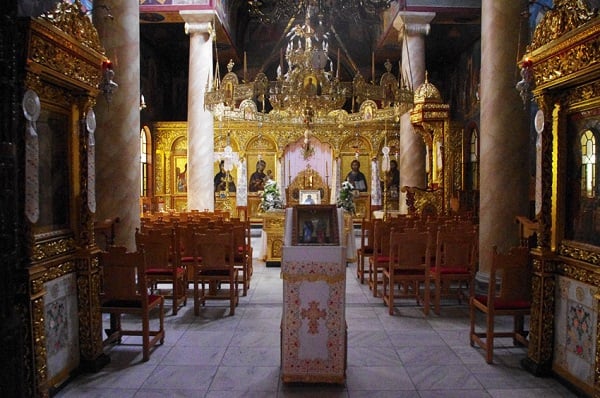The concept of common ownership of property is profoundly Christian in its theological content (Dr. Nikolaos Koios, Content Coach of Pemptousia)
20 Φεβρουαρίου 2017
[Previous post: http://bit.ly/2l3FxdD]
So the whole structure and organization of today’s coenobitic monasticism is such that, through the common ownership of property, each monk or nun is guaranteed personal poverty and the spirit of renunciation is ensured for each monk or nun. They’re provided with the necessities, without owning anything, they work wherever they’re asked to without any ambition. All the financial activities of the Monastery are conducted or the needs of the community, in a spirit of service. Anything that creates additional distraction or abuse through excessive commercial or business activity is held to be a deviation from the norm. Profit is never the aim, only meeting the needs of everyday life, as defined by the canons of the monastic life, of hospitality, of conservation and of charity work. Any surplus that occurs is placed at the disposal of those who are in a weaker position.

The case of the Holy Mountain in particular demonstrates the desire on the part of Orthodox monasticism to retain intact the spirit of common ownership on an institutional and geographical level. Throughout its history, apart from hospitality, charity and the conservation of cultural monuments, the economically more viable monasteries have always supported those which are weaker. As regards the hermits and those who live in sketes and kellia, what are known as dependencies, most of their daily living expenses are met by the ruling Monastery to which they belong. It’s also well-known that hundreds of people find work in the multitude of tasks performed in monasteries and convents. So we can still see today the adherence to the practice and spirit of the ancient canons of coenobitic monasticism to which we referred at the beginning of our paper: all the necessary conditions are preserved for worship, prayer, peace and quiet, poverty, renunciation, instruction, study and, at the same time, there is sound financial management.
The danger of deviation from the norm is ever-present, which is why it’s noted and condemned. In one of his first speeches to the assembled brotherhood of the Holy Monastery of Simonos Petras, the then abbot, Elder Aimilianos, says that if the spirit of the monks in their everyday lives is attached to earthly things, then, instead of being united with the Holy Spirit, it’s united to carnal forces, cares and desires. If monks or nuns doesn’t attain quietude and constant and undistracted prayer, then the monastery becomes a legal entity and is no longer a dwelling-place of God and a school for souls, with the result that the monastics are fooling themselves, God and other people. The surest way to avoid this is continuous re-baptism in the teachings of the Gospel, the quest for spiritual guidance from experienced elders and perseverance in the coenobitic tradition, which is expressed by submission of the personal for the common interest, through the common ownership of property. This spirit is not limited to monasticism, but, according to Saint Theodore the Studite is “a coenobitic Church” .
So the concept of common ownership of property is a notion which is profoundly Christian in its theological content, in its moral expression and its historical implementation; it’s the framework for any consideration and justification of the ownership of property and of financial management both by monasteries and by the whole of the Church. Besides, the community spirit of the Early Church in Jerusalem, “where their hearts and souls were one”, and they had everything in common, also inspired, to a great extent, the founders of the European Union . In difficult times, such as those of today, where the protection of money is beginning to displace human and social values, the coenobitic spirit and the virtue of common ownership, the bases for the financial management and activities of the monasteries and of the Church in general, could prove to be a paradigm for social and political leaders.





